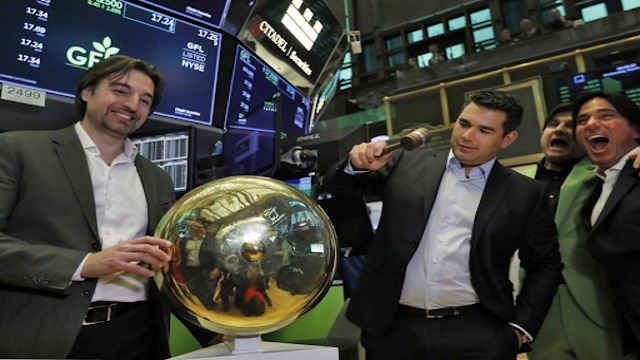
GFL Environmental CEO Patrick Dovigi, second left, is joined by BC Partners Paolo Notarnicola, left, as he rings a ceremonial bell on the floor of the New York Stock Exchange, Wednesday, March 4, 2020. THE CANADIAN PRESS/AP/Richard Drew
In 2023, Canada's 100 highest-paid CEOs received an average of $13.2 million, including salaries, bonuses, and other forms of compensation, according to the Canadian Centre for Policy Alternatives (CCPA). While this marks the third-highest total in the CCPA's data since it began tracking CEO pay in 2007, it reflects a dip from the record-breaking years of 2021 and 2022.
David Macdonald, a senior economist at the CCPA and the author of the report, noted that while CEO compensation remains significantly higher than historical levels, the decline is linked to factors such as lower profits in 2023 and wage increases among workers amid ongoing inflation.
By the morning of January 2, 2025, the CCPA's data indicated that the average CEO on the list had already earned $62,661 by 10:54 a.m., which is equal to the annual salary of a typical Canadian worker. This stark difference underscores the growing pay gap between executives and their employees.
In 2023, the highest-paid CEOs earned an average of 210 times more than the average worker, a sharp increase from 104 times more in 1998.
At the top of the list was Patrick Dovigi, CEO of GFL Environmental Inc., whose total compensation reached an impressive $68.5 million. He was followed by Joshua Kobza of Restaurant Brands International Inc. at $39.1 million and R.M. Kruger of Suncor Energy Inc. at $36.8 million. While salaries accounted for a smaller share of these figures, other forms of compensation, such as share-based awards and stock options, made up the bulk.
Macdonald pointed out that salaries are increasingly a smaller component of CEOs' total earnings, with some even taking a symbolic salary of just $1, like Shopify's Tobi Lutke and Murray Edwards of Canadian Natural Resources Ltd., both featured on this year's list. In 2023, the average cash bonus for the top CEOs was $2.3 million, with bonuses often rising regardless of a company's performance, despite being intended as performance-based rewards.
The report also highlighted the gender disparity among the highest-paid CEOs, with only three women making the list, compared to five named Scott and four named Michael. However, Macdonald noted a positive development, stating that workers' pay had notably increased in 2023, catching up to inflation, and the three women on the list out-earned many of their male counterparts.
The CCPA continues to track policy changes aimed at reducing the growing pay gap. For instance, in 2024, Canada increased the inclusion rate for taxing capital gains over $250,000 to 66%, though this change didn't affect CEO pay for 2023. Additionally, a 2021 policy capped the tax deduction for stock options at $200,000 per year, a move that has resulted in a significant reduction in stock options as a form of compensation for CEOs.
Macdonald explained that stock options, once favored for their tax advantages, have now been largely replaced by direct share awards. He also debunked the notion that exorbitant CEO pay is necessary to attract top talent, pointing out that most of the CEOs on the list were promoted from within their companies, with an average tenure of 21 years at their firms.
The report recommends more direct measures to address the wealth gap, such as implementing a wealth tax on Canadians with assets over $10 million, which could generate an estimated $32 billion annually. It also advocates for higher marginal tax rates for the wealthiest, noting that Canada's top tax rates were much higher in the postwar years, when they approached 70%, compared to the current top rate of around 50%.















